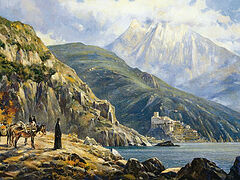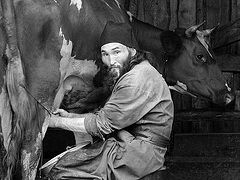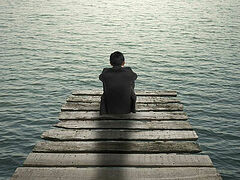Lake Vselug, located in the Tver region, is where the upper reaches of the Volga flow. For many, this area is primarily known for fishing and is believed to be one of the greenest and cleanest holiday destinations in Europe. However, not everyone knows about one of the two small islands on the lake and its unique history.
Zosima and Savvaty island, also known as Maly (Little) Solovki, is famous for being called Bozhye Delo, which means “God’s work”. This name originated from Monk Joel (secular name: Jonah) who, in the eighteenth century, was the first to serve at what was then the wooden Church of the Protecting Veil of the Most Holy Theotokos. He collected pennies “for God’s work” from visiting merchants and all those who were not indifferent to the cause, which was the construction of a monastery. Over time, Jonah became the founder of the New Solovki Vselug Monastery, which was established in 1701. In 1728, the construction of the stone Holy Trinity Church with side chapels of the Protecting Veil of the Mother of God, and to Sts. Zosima and Savvaty of Solovki, commenced on the island.
Currently, only the foundations of the monastery ensemble remain, as all the monastery buildings were demolished during the Soviet era. In 1929, the monastery brethren were exiled, and some became martyrs who have since been canonized.
The wooden Holy Trinity Church was built in 1997 on the site where the Holy Trinity Cathedral of the New Solovki Monastery was destroyed. Since 2021, work has been underway on the island to revive the ancient monastery.
Fr. Arkady:
—When you go out into the street of your dormitory suburb you are already serving: the way you behave on a tram or a trolleybus, give your seat up to someone, give someone a penny, smile to someone and refrain from kicking someone in return. Someone kicked you, but you won’t do the same to him—you will pity the person and pray for him. You come to work where some have not slept enough, others are out of sorts. And you smile and say: “My dears, everything will be fine! Life is only beginning. We should rejoice in everything.”
—In the Tver region, on the small island of Bozhye Delo, an ancient monastery is being revived—the New Solovki Vselug Monastery. Tell us about this place. When did monastic life begin here?
—By the grace of God, with the arrival of St. Jonah the first monks of the future monastery settled here. The first was St. Jonah, who lived as a hermit. He came here in 1701 and lived in the hollow of an oak tree where he made himself a “cell”. Then more brethren came and lived in tree hollows as well. There used to be many oaks here—a whole oak grove. And they lived in makeshift cells in those oaks and repeated the asceticism of St. Nilus, who had lived like this for about twenty-seven years on Stolobny Island. St. Jonah did not lie down on a bed for forty years. He made himself a church seat patterned after the Greek stasidia. Like St. Nilus, he made hooks in the oak (his cell) by drilling holes in the tree. A monastery, all the infrastructure necessary for it, churches and cells were being built; but St. Jonah nevertheless continued to live in his poor cell till the end of his life.
 Archimandrite Arkady (Gubanov)
Archimandrite Arkady (Gubanov)
There was a reason why St. Jonah came here. How did St. Nilus come to Stolobny Island? He prayed to God, “Lord, what should I do in order to attain salvation?” The Lord answered him, “Go to Stolobny Island, and there you will be saved.” Stolobny Island was then uninhabited. At that time (the sixteenth century) it was a place of pagan temples, and in fact until the reign of Peter the Great there were various pagan cults active. The island’s name—Stolobny—means “pillars”; idols were made in the form of pillars. When the saint arrived there, he began to live among pagan temples and triumphed over all the evil forces.
However, the locals wanted to kill him and plotted various intrigues inspired by satan in order to get rid of him. So there was a reason why St. Jonah came here, with God’s blessing, because such sacred places as this island were still influenced by pagan culture. These places were isolated and uninhabited. It was impossible to settle here because there was an open-air pagan temple. These islands, which served as pagan temples, had always been a special place for pagan spiritual practices. So St. Jonah came here by Divine Providence, struggling here and blessing this site by his prayers, and the Lord blessed this place by His grace. And a monastery appeared here, which existed until 1929.
—Are there any ancient icons left here?
—I can’t say anything about ancient icons... I can say nothing about large icons. When everything was closed, locals would usually take icons home, but there followed the German occupation and various other circumstances. Virtually nothing has survived. They say that some icons might be in storerooms in Moscow because they were taken there when the church was closed. We are dealing with this issue, looking for some evidence. Even before the church was demolished in 1947, photographs of this church had been taken, including the wall paintings; and these photographs are somewhere in Moscow. We are looking for opportunities, and we will pray that the Lord will reveal all this.
—Life on an island has its distinctive features. What do you have to face?
—I lived in St. Nilus Monastery for twenty years. It is also an island, but there is a bridge there. But there is no bridge here. However, transport links us to the mainland. There is no sense of isolation from the mainland. The Lord said, The Kingdom of God is within you (Lk. 17:21). And the most important thing is the understanding that you are united with God, and your understanding of the Kingdom of God, which is everywhere. All you need to do is open your heart to God.
In the summer both pilgrims and tourists come here. There are many people who come to venerate this holy place and honor the ascetic labors of the monks who lived here. They travel in boats. In winter, of course, there are fewer people.
—In the summer they travel in boats, but what about the winter?
—They use snowmobiles and all kinds of sleds. We have a hovercraft that can be used in foul weather.
—Is the island sometimes cut off from the outside world?
—This has not happened yet. In the two years I’ve been here this has never happened. Thank God, transportation works. I wish I could feel something like that, but it just doesn’t happen.
—Are you currently restoring the monastery?
—Yes, we are. For now, it is the Holy Trinity parish, but over time there will be a monastery. For three years it will be a bishop’s metochion, and then after three years we will be able to apply for the registration of a monastery. We already have fifteen brethren and about fifteen monastery laborers—the necessary number for a monastery. We already have the required number of buildings and are building more.
—What have you accomplished over your time here?
—Guest houses and refectory buildings are necessary infrastructure for life, as are repairs to the house and church that were already here. But construction work is not an end in itself—it is for the salvation of souls...
Guests and pilgrims can now visit and stay overnight, with necessary amenities such as water, light, and sewage. In modern times, pilgrimages often require more comfortable accommodations than just a tent.
We now live as a full-fledged monastery, with our own rule and specific way of life. We are not waiting to become an official monastery before we begin our monasticism. Just as a lay person dressed in a monastic habit does not become a monk overnight, entering a monastery requires living according to the monastic way of life and following the necessary rules. Only after the tonsure does one fully become a monastic.
We celebrate daily services and follow the Typikon for meals, sleep, and work. We have an assistant to the abbot, a steward, and a treasurer. We have all the necessary infrastructure, which must be brought into line with the norms and Typikon of the Russian Orthodox Church.
—What are your plans for the restoration of the monastery?
—We don’t have any plans except for the salvation of our souls. And certain possibilities are attached to it, which may or may not be realized. You can plan a great deal, but that will just be fantasizing. We live here and now—we need to make a refectory. There are already many of us, and our refectory is temporary. And we need one more small church. I think over time a refectory church can be built to have a refectory and a church in one complex, under one roof. It is easier to heat and maintain.
There are many brethren, and we need to have a medical unit. There should be a dressing room, a pharmacy, and an isolation ward. If someone falls ill (there are lots of epidemics nowadays), he can be isolated and kept under control. I am a paramedic by profession and know how all this is organized. Now we are looking for an opportunity to set up such a medical room here. Many people—fishermen, hunters, and tourists—come here, especially in the summer. Someone’s blood pressure needs to be measured, someone needs a pill, etc. They sometimes turn to us for medical aid. People can forget to take medicine with them. You never know what can happen—someone may need to have a wound bandaged. Therefore, a very important point is the provision of first aid. We are at the crossing of all waterways, and people turn to us, knowing that there is something here.
—For many years you headed the St. Nilus Monastery. Tell us about that ministry.
— I was twenty years at St. Nilus Monastery. I want to write a book. Actually, it is almost ready. I want to call it, Archimandrite Arkady (Gubanov). Twenty Years Without the Right to Correspondence.
—Why without the right of correspondence?
—Because there was no time to write. Now I am free and can write something. When construction was going on, many commissions came—for construction, the environment, and the protection of monuments. They would all say: “Fr. Arkady, you should be imprisoned for at least fifteen years for what you are doing here.” Not all the documents were collected on time. Certain parameters and State standards of construction and other kinds of work were not always observed… You know, need changes the law. There is such popular wisdom. There is a law that must be followed, but if there is a need, we have to change it, at least for ourselves and for the circumstances that need changing. So they told me: “Fr. Arkady, you are asking for prison. Haven’t you been jailed yet? We just haven’t gotten around to it yet.”
 St. Nilus of Stolobny Monastery. Photo: Viktor Ivanovich Pechenev / Temples.ru
St. Nilus of Stolobny Monastery. Photo: Viktor Ivanovich Pechenev / Temples.ru
—And how did you react?
—I thought, “Lord, at least I’ll get some rest.” I said, “Only give me a solitary cell, where they lock up the most dangerous criminals. I’m one of them. Incarcerate me alone so that I can’t ruin anyone’s life. And I will be the happiest man in the world. Fifteen years! I won’t be able to thank you enough.” This is the book I decided to write, so let the bookworm community wait for it.
—You’ve intrigued us.
— “There are many miracles and spiritual revelations, because for me it was a very great spiritual experience, being a young monk who had been tonsured and appointed assistant to the abbot., I was the assistant to Abbot Vassian for ten years, and for another ten years, I was the monastery abbot. Now the monastic life goes on.
There was the following story. A man came to our monastery. They called me and told me, “Batiushka, a man has arrived who wants to be a monk.” He was standing with his things, a huge icon, his wife, and grown daughter. I thought he must have been crazy to come with his belongings, wife, and daughter and say that he would like to be a monk at our monastery. “Let him walk around and take a look at our monastery, but he cannot join us as a monk. There are some requirements that he must meet.”
My words were conveyed to him, but he said that he would not leave here and would become our monk. I came and saw a man with his things, a huge icon, and his wife and daughter next to him. “Have you come to us?” “Yes, I’ve come to you forever.” “That’s very nice. We have been waiting for you all our lives. At last, you’ve come to us,” I said. “What is your name?” “Eugene.”
We went to the refectory for a cup of tea and started talking. He said that at one time, in the early 1980s, he had had a vacation here on Lake Seliger with his wife Galina. He was a “crime baron”—an expert at playing cards. He had his own guards, security service, and transport. He was guarded by all structures—both Soviet structures and his own. He was a “crime baron” in the sense that he played cards—for big money. He said, “I have such a talent—I always win. I can lose to bring a person into the game, and then I win all the time because I am such a person. I have great luck. I gave one apartment to my daughter, the second to my wife and sold the third one and donated half of the money to the poor. Now I have brought the other half to you.” And he handed us a bundle of money. I don’t remember how much money there was. “I also bought an Iveron Icon of the Mother of God. I greatly venerate the Iveron Icon. Here’s a gift for you.” It is still in our refectory.”
“Once,” he continued, “when my wife and I were on vacation on Lake Seliger, we were going around the island in a boat, and suddenly I heard a voice telling me that at this monastery I would die in such-and-such a year. And the exact date and year were given. But in what monastery? There were only ruins around here in the Soviet era. So, batiushka, I have two years to live, and I’ve come here to prepare for death. I’m unworthy to be a monk, but with you, I’ll live like a monk.”
I always cite this Eugene as an example. He became an excellent monk by his way of life. He died the very day and hour that had been predicted to him. He underwent surgery on his leg, as there were problems with his blood vessels. He had anesthesia, everything was fine, and the operation was over. He said goodbye to everyone and died. When he was going to the hospital, he said that he would never return. He gave away all his personal belongings for people to remember him in prayer.
He was a very cheerful man. Death was Pascha for him—passing into eternity, into eternal life. He was not sad; he was in such a joyful state from the awareness of this. “The Jewish people walked in the desert for forty years, but I must get sick and labor for two years. This is my two-year wandering in the desert. I must eradicate the crime baron in myself during these two years that God has given me to live in this monastery.” Look at his spiritual discernment. Let’s recall that the Lord looked down upon the Apostle Paul, a persecutor of Christians, and called him to faith, a change in his lifestyle, and apostolic ministry. Likewise, the Lord looked upon this Eugene, and like the Good Thief, led him into His Kingdom of Heaven. He is buried near St. Nilus Monastery.
—Do you think it is necessary to restore destroyed churches and monasteries even where there are few parishioners?
— Everything is at the discretion of the Church hierarchy. There is a ruling bishop who decides whether it is necessary or not, and there are people who come there. It also depends on the possibilities, primarily financial. If there are financial opportunities, why not restore the church located at someone’s birthplace? When the time comes, people will settle there. Where there is a church, there is life. People settle near churches. Nowadays, many people in Russia are moving from cities to the countryside. Where are they moving? Closer to churches. They settle around churches. Life is being renewed—it’s natural. A river, a church, and a forest—all these provide not only color, but also good living conditions.










